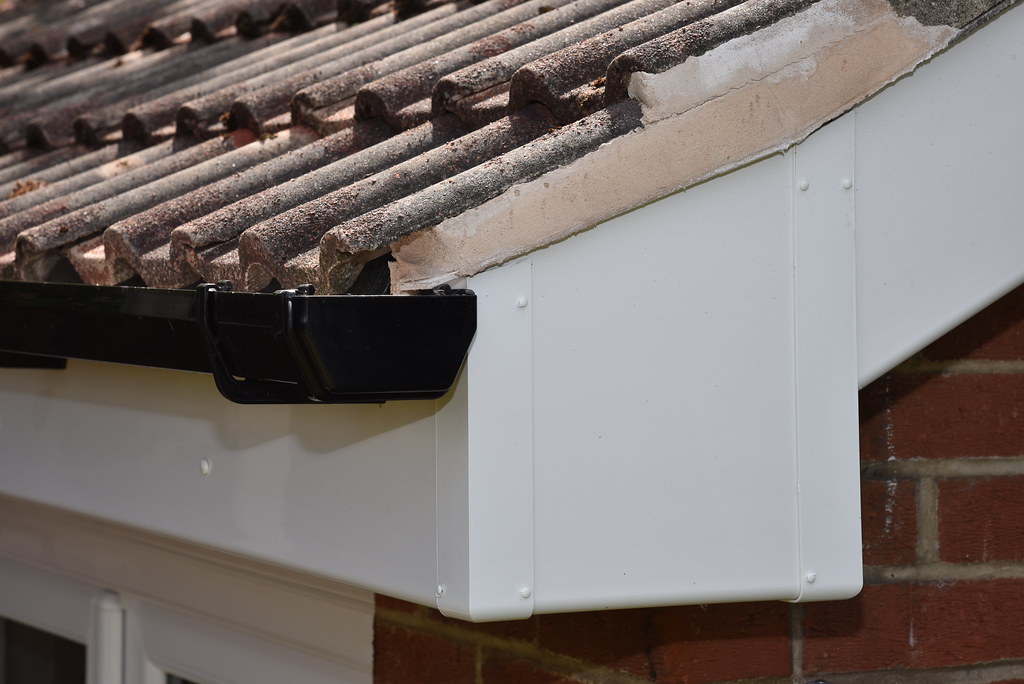
The Importance of Commercial Fascia Board Repair and Aluminum Soffit Installation in Harsh Climates
September 29, 2025
Your commercial building’s fascia boards and aluminum soffits act as critical defense systems against New England’s harsh weather conditions, with fascia protecting roof edges and supporting gutters while soffits provide necessary ventilation. When facing continuous snow, ice, and freeze-thaw cycles, damaged or incorrectly installed fascia and soffits can result in significant structural problems, such as water damage and energy loss. You’ll need to guarantee timely repairs and professional installation using treated wood fascia boards and perforated aluminum soffit panels to uphold your building’s integrity and comply with local building codes.

Understanding Fascia Boards in Commercial Roofing Systems
Your commercial building’s fascia boards play a vital role in supporting gutter systems and sealing the edges of your roof. These essential components create a protective barrier that prevents water from infiltrating your building’s structure at the roofline. When properly maintained, fascia boards work alongside your gutters to direct water away from your building’s foundation while protecting the underlying roof structure from moisture damage.
Fascia boards support gutter systems, seal roof edges, and protect structures from water intrusion, making them essential to commercial roof health
While many building owners focus primarily on their main roofing materials, fascia boards play an equally important role in protecting commercial structures. Your fascia board repair needs careful attention, as these components serve three critical functions: supporting commercial gutter systems, creating watertight seals along roof edges, and preventing moisture from penetrating your building’s structural elements.
The Role of Aluminum Soffits in Building Protection and Ventilation
Your commercial building’s aluminum soffits play a critical role in protecting your investment through proper ventilation and moisture control. When installed correctly, perforated aluminum panels create essential airflow pathways that help regulate attic temperatures while blocking unwanted pests from entering your structure. You’ll also benefit from the added fire resistance that aluminum soffits provide, making them particularly valuable in harsh climate zones where building protection is paramount.
Aluminum soffits improve attic airflow, resist moisture and pests, and add fire-resistant protection for commercial structures in extreme climates
Because proper ventilation is necessary for commercial buildings, aluminum soffits play an important role in maintaining structural integrity and safety. When paired with commercial fascia board repair, fire-resistant soffit panels provide vital protection against extreme weather while preventing moisture buildup. Perforated aluminum panels create effective attic ventilation systems that regulate temperature, block pests, and enhance your building’s overall performance and longevity.
Climate Challenges: Why New England Weather Demands More
New England’s harsh winters put your commercial building’s fascia boards and aluminum soffits through extreme stress as freeze-thaw cycles repeatedly expand and contract these critical roofing components. You’ll find that ice dams and heavy snow accumulation can severely strain fascia boards, potentially separating them from the roof structure and compromising their ability to support gutters. If you don’t address these weather-related challenges promptly, damaged fascia and soffits can allow water infiltration into your building’s interior, leading to expensive structural repairs and potential business disruptions.
Freeze-thaw cycles, ice dams, and heavy snow can damage fascia and soffits, leading to roof edge failures and costly interior water damage
The relentless cycle of winter weather in New England creates unique challenges for commercial building exteriors. When ice dams form along compromised fascia, they’ll force water beneath roofing materials, causing freeze-thaw roofing damage. You’ll need properly installed roof edge protection systems to prevent structural deterioration. Without ice dam prevention fascia, your building faces costly repairs from water infiltration and material failure.
Benefits of Timely Fascia Repair and Soffit Replacement
You’ll protect your commercial building from costly water damage and structural issues by addressing fascia board repairs and soffit replacements as soon as problems emerge. Your timely maintenance of these critical roofing components will boost your building’s energy efficiency while maintaining proper ventilation and moisture control. Additionally, you’re more likely to meet insurance requirements and enhance your property’s visual appeal when you keep fascia boards and aluminum soffits in top shape.
Maintaining fascia and installing aluminum soffits prevents leaks, improves energy efficiency, enhances curb appeal, and supports insurance compliance
Maintaining properly installed fascia boards and aluminum soffits delivers multiple benefits for commercial building owners in harsh climates. Your investment in fascia wrap installation and commercial soffit ventilation protects against costly repairs while maximizing property value.
- Prevents fascia board water damage and structural deterioration
- Improves energy efficiency through proper attic ventilation
- Maintains professional appearance and increases curb appeal
- Satisfies insurance requirements and building code compliance
Installation Best Practices and Material Recommendations
Professional installation of fascia boards and aluminum soffits demands choosing high-quality treated materials that can withstand harsh weather conditions. You’ll need weather-resistant sealants and reinforced brackets to guarantee proper support and prevent moisture infiltration at connection points. Your installation should include ventilated aluminum panels that permit proper airflow while upholding structural integrity against snow loads and freeze-thaw cycles.
Professionals use treated materials, sealants, reinforced brackets, and ventilated aluminum panels to ensure long-lasting performance in harsh weather.
Consistently safeguarding commercial buildings from severe weather requires high-quality materials and proper installation techniques. When taking on fascia and soffit replacement in New England roofing components, you’ll need:
- Pressure-treated timber rated for outdoor use
- Ventilated aluminum soffits with appropriate perforation ratios
- Industrial-grade sealants and waterproof barriers
- Sturdy galvanized brackets engineered for snow and ice loads
These materials guarantee maximum durability and adherence to building codes.
